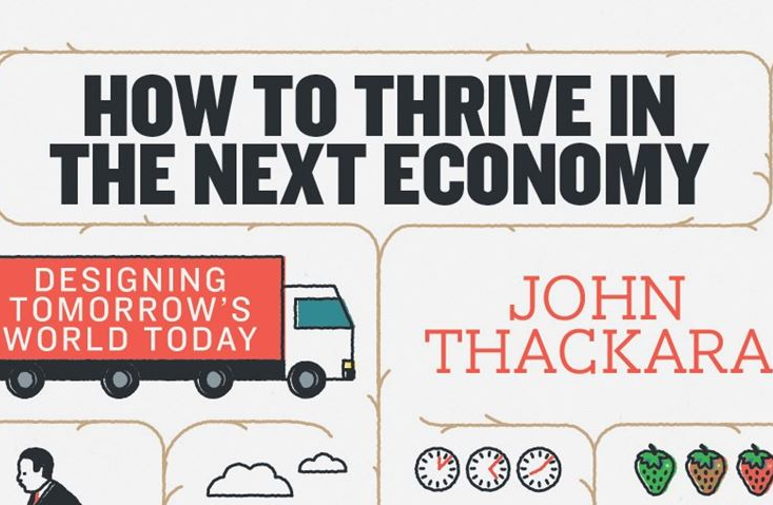John Thackara is one of the brilliant irregulars exploring how humankind can make the transition to a climate-friendly, relocalized, post-capitalist world. You can’t pigeonhole him in any occupational category or disciplinary tradition because he is so effortlessly transversal. He blends his broadly international and nonsectarian perspective with the many particular projects that are Building the New.
This helps explain why Thackara’s work is so appealing: It speaks to us as whole human beings where we live, in distinctive local circumstances. While rigorous and empirical, Thackara isn’t constrained by the jargon and norms of a particular discipline or theory. Like so many designers, he lives on the messy creative edge where interesting new things are always emerging. (Check out his website at thackara.com.)
On my latest episode of Frontiers of Commoning (Episode #34), John and I have a spirited conversation about the things preoccupying him these days: how to design for bioregional, post-capitalist economies; the many local projects that are quietly making a new world; and corporate subterfuges such as “net zero,” carbon offsets, and the financialization of nature.
Thackara, a Brit who lives in the south of France, has taught at major universities in Japan, China, and Italy, and held prominent posts at the Netherlands Design Institute and the Royal College of Art in the UK. Now an independent writer, activist, and designer, John avoids arid abstractions; he prefers to document the practical alternatives to capitalism popping up all over.
His 2018 book, How to Thrive in the Next Economy, is a compelling survey of dozens of eclectic projects that are pointing the way forward. He has described the subjects of his journalism as the “soil restorers and river keepers; seed savers and de-pavers; care farmers and food system curators; fibershed stewards and money designers.”
I feel a kinship with John’s effort to elevate the people and projects that, despite a toxic and regressive political scene, are pioneering promising new pathways. Thackara calls such work as “designing for life,” by which he means developing project designs that support embodied human beings rather than ideological agendas. It’s also about supporting the more-than-human forms of life in the world and future generations.
In recent months, dismayed at corporate responses to the climate catastrophe, John has compiled a list of the many propaganda scams that corporations are funding to help them delude themselves and the public that meaningful actions are being taken. The term “sustainability” has become rather threadbare and degraded, so new subterfuges have to be invented. These include “net-zero” carbon schemes, “offsets” of carbon emission, the Green New Deal, “sustainability reporting,” “nature-based solutions,” and “regenerative” practices, among many other greenwashing buzzwords posing as serious solutions.
Thackara also assesses how modern agriculture could be revamped to reduce its carbon emissions. He sees a great divide between the “eco-modernists” who think that new technological breakthroughs will provide answers, and those who instead look to decentralized farming and degrowth as the most credible solutions.
The scale at which carbon problems are addressed is essential, he insists: “Seventy percent of the world’s food or more is grown by small farmers but it’s not 70% of the value [as traded in markets],” Thackara noted.
But because eco-modernists are so wrapped up in data and scientific abstractions,
“they can’t take seriously the possibility that we’re actually within reach of having a sustainable food system if we just remove the energy intensive, capital-intense industrial version. There is an inability to think beyond very simplistic notions of calories or protein production, and so they say it’s inconceivable that we could feed the world with all these small local farmers.”
You can listen to the full interview with John Thackara here. A transcript of the interview can be found here.






